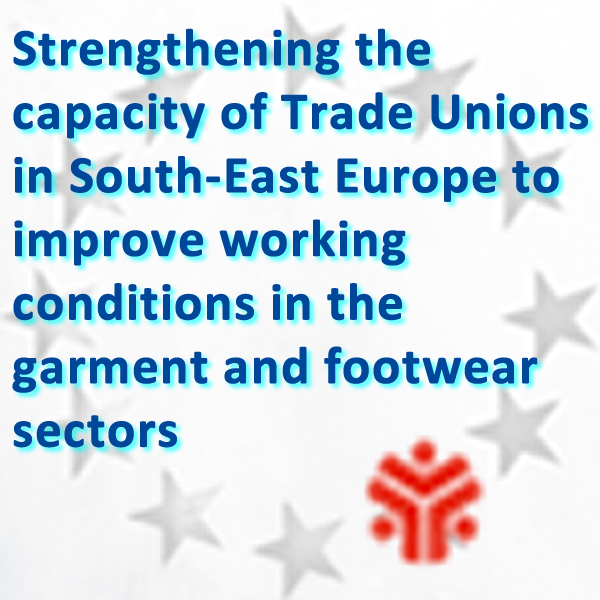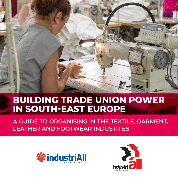Strengthening the capacity of Trade Unions in South-East Europe to improve working conditions in the garment and footwear
With financial support of the EU
industriAll Europe is deeply concerned about the situation and evolution regarding working conditions in the garment and footwear sector in South-East Europe. Working conditions are often very poor in complex structures of multinational enterprises. Therefore, we have designed an ambitious two-year project in order to map and analyse this sector and to develop strategies to improve the state of play. The project will support EU policies in several ways, in particular with regard to social dialogue, job quality, health and safety, living wages and equal opportunities. In a nutshell, we aim at bringing the reality of the trade unions in the South-East closer to the one of the EU.
ACTIVITIES:
6 regional workshops
- Sofia, November 2018
Bulgaria has the lowest minimum wage in the European Union, 260 euros per month, which has contributed to hundreds of thousands of young people leaving the country in recent years. Representatives of H&M, Inditex and ASOS are cooperating with unions. [ read more ] - Zagreb, December 2018
Croatia: Average monthly net wages in the textile and leader sectors are around 530 euros. This is higher than neighbouring countries but many graduates are still leaving for careers in Sweden, Germany, France and even China. The government is engaged in the project and unions from Austria and Slovenia are supporting their Croatian colleagues. [ read more ] - Bucharest, January 2019
Romania: Workers earn around 250-300 euros net after social security contributions and Romania now has the highest percentage of young people at risk of poverty than any other EU country. A major problem is the destruction of collective bargaining during the financial crisis. Anti-union laws which apply to companies with under 15 staff mean some 90% of companies don’t have representation. The current government is now beginning the process of reversing these policies and H&M and Inditex are among brands engaging in the project. [ read more ] - Belgrade, February 2019
Serbia: Average gross wages range from 319 euros per month in clothing industries to 438 euros in textile, well below the industry average of 498 euros. Unpaid overtime is rife. Employers taking part in the project called on brands to raise their prices so that they can raise wages. [ read more ] - Skopje, March 2019
Macedonia: The gross minimum wage has recently been raised to 280 euros per month. The Dutch Fair Wear Foundation (FWF) has developed a labour costing tool to clarify the shared responsibility between a buyer and a supplier. Brands present in the country include Inditex, Esprit and ASOS as well as ACT members C&A, Next, Primark and PVH. [ read more ] - Tirana, March 2019
Albania: 90% of workers are women and the average age is lower compared to other countries. The minimum wage of 208 Euros is the lowest in the region. Labour inspections found wage payment delays, missing social contributions, bad working conditions and dismissals. But workers, particularly in rural areas, are often worried about joining trade unions.
[ read more ]
Final Conference
- Sofia, November 2019
Cooperation is key to securing a qualified workforce and living wages in South-East European textile industries. This was the conclusion by 100 national and local union leaders, employer associations and fashion brands at a conference organised by industriAll Europe and IndustriALL Global Union on 12-13 November 2019 in Sofia. [ read more ]
Documents
